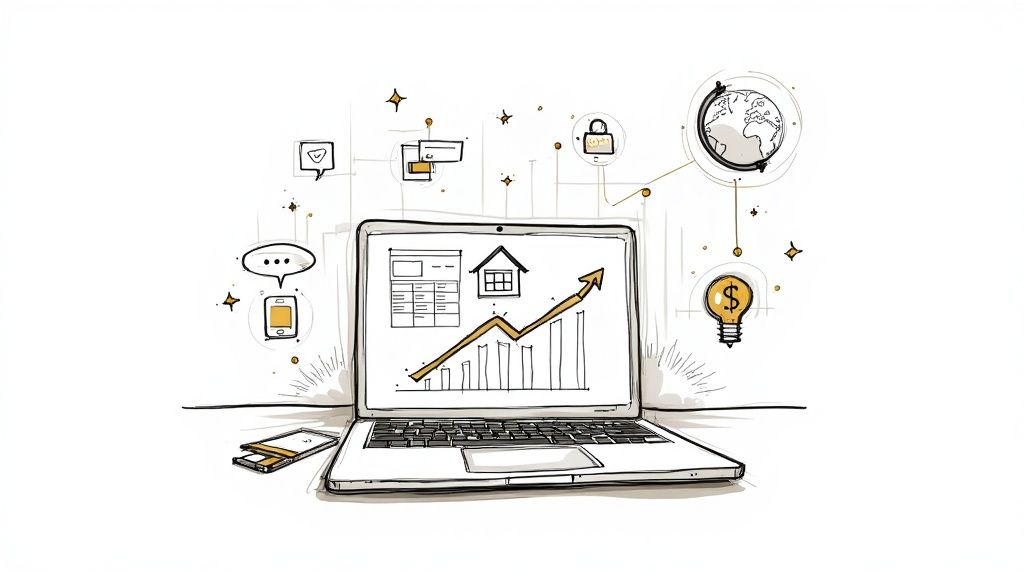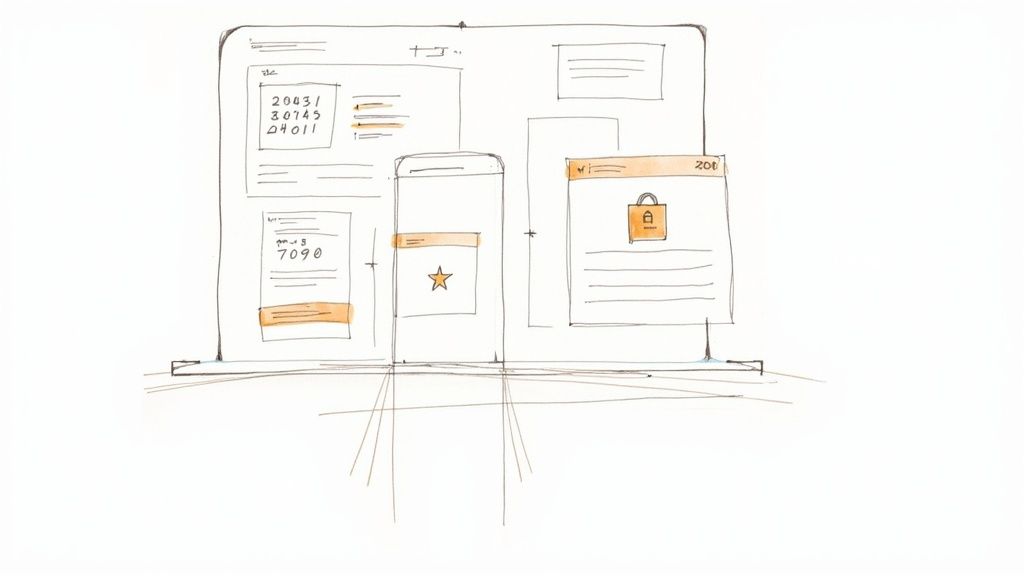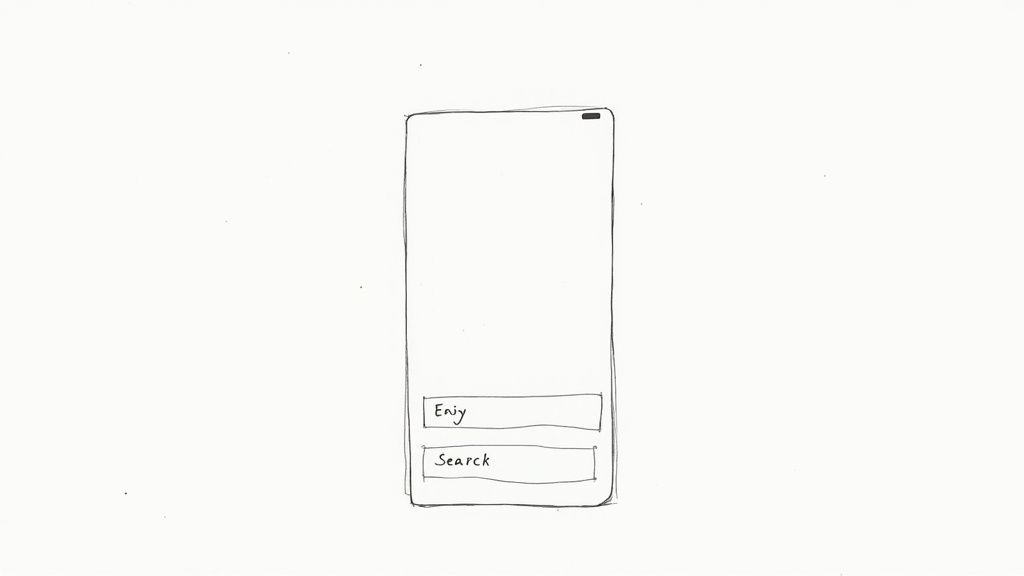
airbnb direct booking website
Build Your Airbnb Direct Booking Website and Boost Revenue
Posted on Oct 1, 2025

Think of an Airbnb direct booking website as your own private storefront. It’s a space you own, online, where guests can book directly with you, cutting out the middlemen like Airbnb or Vrbo. This simple move saves everyone money on those pesky service fees, but more importantly, it puts you firmly in control of your brand and lets you build real relationships with your guests.
Why a Direct Booking Website Is a Non-Negotiable Asset
Sure, dodging booking fees is a great perk, but the real power of having your own platform runs much deeper. It's about graduating from being just another listing on a crowded platform to building a durable, independent hospitality business.
When you're all-in on a platform like Airbnb, you're essentially just a tenant on their digital property. They call the shots. They own the guest data. They can tweak their algorithm or change the rules with zero notice, and your business feels the impact.
An Airbnb direct booking website completely flips that script. Suddenly, you own the guest's entire journey, from their first click to their final thank-you note. In an era where the major platforms are constantly shifting their policies, this control is priceless. It's no wonder property managers are scrambling to diversify. One recent survey saw a staggering 60% jump in managers looking into other channels in just four months—a clear signal that the industry is making a strategic pivot toward independence.
Gaining Full Brand Control
Your own website is a blank canvas. It’s your chance to tell your property's unique story without being squeezed into a standardized template.
This freedom allows you to:
- Carve out a unique brand identity. Use your own logo, colors, and stunning photos that truly capture the vibe of your rental.
- Showcase what makes you special. Got amazing local partnerships or an amenity no one else has? Shout it from the rooftops without worrying about character limits.
- Build instant trust. A professional, slick website tells potential guests you’re a serious operator who cares about their experience.
Cultivating Lasting Guest Relationships
Nothing beats direct interaction for creating real hospitality and encouraging repeat visits. When guests book direct, you get their contact info. This is gold.
Now you can build a database for future marketing, send personalized thank-you emails, or offer special discounts to loyal guests. It’s a level of connection you can never achieve through a third-party platform. Getting a handle on this requires understanding short-term vs. long-term rentals and the different guest dynamics involved.
The ultimate goal is to create a business that isn't at the mercy of platform algorithms or policy updates. A direct booking site is your insurance policy, ensuring your business has a stable foundation for long-term, profitable growth.
Choosing the Right Tech for Your Booking Site
Picking the right technology for your Airbnb direct booking website is one of those make-or-break decisions. This isn't just about a website; it's the engine for your entire direct booking business. The platform you choose will shape everything from how you spend your days to how much profit you see at the end of the year.
You’ve basically got two main paths to go down: purpose-built vacation rental website builders or general-purpose platforms like WordPress that you can adapt for bookings.

There are pros and cons to each, and the best choice really comes down to an honest look at your own skills, budget, and how much time you can realistically sink into this. Think about it: if a platform saves you 5-7 hours a week on admin headaches, it’s probably worth paying a bit more for.
All-in-One Vacation Rental Platforms
This is the fast track. Platforms like Lodgify, Hostfully, or Uplisting were created from the ground up specifically for hosts like us. They are, without a doubt, the quickest and most straightforward way to get a professional, high-converting booking site up and running.
These tools are designed to solve the exact problems we face every day, bundling all the essential features into one slick package:
- Built-in Channel Manager: This is non-negotiable. It automatically syncs your calendars across Airbnb, Vrbo, and your own site, which means you can sleep at night without worrying about double bookings.
- Integrated Payment Processing: They handle the money side of things, letting you securely take credit card payments through services like Stripe or PayPal without you needing to be a tech wizard.
- Plug-and-Play Website Templates: You get access to professionally designed, mobile-friendly templates. Just drop in your photos, tweak the text to match your brand, and you’re pretty much good to go.
The real win here is the sheer simplicity and efficiency. You're buying a system that just works, freeing you up to focus on being a great host instead of a part-time web developer. For a deeper look at the options, we've got a full guide on the best website builders for vacation rentals that breaks it all down.
The core value of an all-in-one platform is peace of mind. Knowing your calendars, payments, and bookings are managed automatically frees you to focus on growing your business and providing an excellent guest experience.
Going the Custom Route with WordPress
The other option is to use a flexible, open-source platform like WordPress. This path gives you ultimate control and nearly endless customization, but it comes with a much steeper learning curve and a lot more hands-on work.
With WordPress, you're essentially building your booking system from scratch by piecing together different plugins. You'll need a booking engine plugin (like MotoPress Hotel Booking), an integration for a payment gateway, and very likely a separate channel manager service to keep your calendars in sync.
While the initial software costs can seem lower, the "hidden" cost is your time. You’ll be the one responsible for the setup, ongoing maintenance, and troubleshooting when plugins decide not to play nice with each other. It’s a fantastic choice for tech-savvy hosts who want to control every single pixel of their site, but it can quickly become a tangled mess if you're not prepared for the technical upkeep.
To help you visualize the trade-offs, here’s a quick look at the most popular website builders hosts are using today.
Direct Booking Website Builder Comparison
| Platform | Best For | Typical Cost | Key Features |
|---|---|---|---|
| Lodgify | All-in-one simplicity | ~$32/mo + 1.9% booking fee | Channel manager, payment processing, mobile app, website templates. |
| Hostfully | Centralizing operations | $109/mo | Robust PMS, digital guidebooks, channel manager, unified inbox. |
| Uplisting | Automation and scaling | $200/mo (for 5 properties) | Automated messaging, cleaning scheduler, damage protection, channel manager. |
| WordPress | Maximum customization | $15-50/mo (hosting + plugins) | Total design freedom, huge plugin ecosystem, but requires technical skill. |
Choosing your platform is a big first step, but the key is to pick the tool that will support your business goals without turning into a second full-time job.
For the vast majority of hosts, an all-in-one solution offers the best balance of power, simplicity, and reliability. It lets you build your Airbnb direct booking website quickly and get back to what you do best: hosting.
Designing a Website That Turns Visitors into Guests
Think of your Airbnb direct booking website as your digital storefront. It's not just a place to display your calendar; its real job is to sell an experience. You need to build enough trust to convince a total stranger to book directly with you. That takes more than just pretty pictures—it requires a smart, intentional approach to design and content.
The absolute foundation of a high-converting booking site is stunning, professional photography. Seriously, grainy, poorly lit phone photos won't cut it. You're competing with highly polished listings on the major OTAs. You need to invest in high-resolution images that tell a story, capturing the unique vibe of your space from the bright morning light to its cozy evening glow.

Crafting Compelling Content and Building Trust
Beyond the visuals, your words carry immense weight. Your property description has to go far beyond a simple list of amenities. Your goal is to paint a vivid picture of the experience a guest will have.
- Evoke Emotion: Don't just say, "queen bed, ensuite." Try something like, "Wake up to serene garden views from a plush queen bed in your own private ensuite oasis."
- Highlight Unique Benefits: Instead of mentioning a kitchen, describe the "fully-equipped chef's kitchen, perfect for crafting a gourmet meal with fresh ingredients from the local farmer's market."
- Tell a Story: Who are you? A short, authentic 'About Us' section helps guests connect with the human behind the listing, turning a cold transaction into a personal interaction.
That personal touch is a powerful trust signal. Another massive one? Social proof. Don't bury your best reviews—feature them prominently! Glowing five-star reviews from past guests provide instant validation. It's no surprise that recent studies show nearly 90% of consumers trust online reviews as much as personal recommendations.
A great website answers a guest's questions before they even think to ask them. It makes them feel secure, understood, and excited to book, all within a few clicks. The goal is to create a digital welcome that feels as warm and professional as your rental itself.
Ensuring a Flawless User Experience
A beautiful site is completely useless if it's a pain to navigate. The booking process has to be seamless, intuitive, and, above all, mobile-first. So much travel planning and booking now happens on smartphones, so your site absolutely must look and function perfectly on a small screen.
This means a clean layout, large and easy-to-tap buttons, and a booking flow that requires as few steps as possible. If a potential guest has to pinch, zoom, or hunt for the "Book Now" button, you’ve already lost them. For a deeper dive into these core principles, our guide on effective vacation rental website design offers even more actionable tips.
Ultimately, every single element—from your photos and descriptions to the placement of your reviews—must work in harmony. The aim is to eliminate friction and build confidence, guiding visitors smoothly from casual curiosity to a confirmed booking.
Setting Up Payments and Policies That Protect You
Your slick new Airbnb direct booking website is live, but the backend is where the real business happens. Nailing your financial and legal framework is what turns a pretty website into a profitable, protected business. This setup is all about getting paid reliably and making sure you’re covered for things like last-minute cancellations or property damage.
First things first: you need a rock-solid way to take payments. Don't cheap out here. Industry stalwarts like Stripe and PayPal are the go-to for a reason. They offer top-notch security, make credit card processing a breeze, and guests instantly trust them. If you’re using an all-in-one website builder, chances are these gateways are already built right in, making integration simple.

Getting this right is more than just a technical step; it’s a signal of professionalism. When a guest lands on a familiar, secure payment portal, it tells them they’re dealing with a legitimate operation. That confidence is often the final nudge they need to hit "Confirm Booking."
Crafting Your Cancellation Policies
Once payments are sorted, it’s time to think about your policies. This is one of the biggest perks of going direct—you make the rules. No more being shoehorned into Airbnb's rigid, one-size-fits-all options. You can now build a cancellation policy that actually fits your business and your ideal guest.
A really effective strategy is to offer a few different cancellation tiers. This gives travelers options and can seriously boost your conversion rate.
Here’s a simple framework to start with:
- Non-Refundable Rate: This is your best friend for locking in revenue. Offer a 5-10% discount for guests who pay the full amount upfront with no refunds. It’s a magnet for travelers who have their plans set in stone and love a good deal.
- Flexible Rate: This is the standard, peace-of-mind option. Guests get a full refund if they cancel up to a certain date, maybe 14 or 30 days before check-in. It attracts planners who need a bit of wiggle room.
- Firm Rate: Find a happy medium. You could offer a 50% refund for cancellations made within a specific window, like 7-14 days before arrival. It balances guest flexibility with your need to protect your calendar.
Think of your policies as your business's safety net. Write them in plain, simple English—no legal jargon—and make sure they're impossible to miss before a guest finalizes their booking. Clarity up front is the key to preventing headaches and disputes down the road.
Defining Your House Rules and Rental Agreement
Last but not least, put your expectations in writing with clear house rules and a straightforward rental agreement. This doesn’t have to be a 20-page legal document. Just a simple, clear page outlining your rules on pets, smoking, parties, and the maximum number of guests.
This is all about protecting your asset and making sure everyone is on the same page. By having guests agree to these terms during the booking process, you’re adding a crucial layer of protection. Setting these boundaries from the get-go creates a professional operation built on trust and respect—for you and your guests.
Smart Marketing Strategies to Attract Direct Bookings
Your Airbnb direct booking website is live, polished, and ready for business. So, now what? The challenge shifts from building to attracting—how do you actually get travelers to find and book through your site instead of just defaulting to the big OTAs? A smart, multi-channel marketing plan is the key, and it doesn't have to break the bank.
The most effective strategies often start small by focusing on the assets you already have. Your goal is simple: create multiple pathways that all lead guests right to your website, making it the most appealing and logical place for them to book.

Lay the Groundwork with Vacation Rental SEO
Search Engine Optimization (SEO) is your long game. It's how you capture free, high-intent traffic from search engines like Google. When someone types in "cabin rental in Asheville" or "beachfront condo near San Diego," you want your website to be one of the first things they see.
This all starts with solid local SEO. Make sure your website clearly states your property's location and talks up nearby attractions.
- Create location-specific content. Don't just list your amenities; write about "The Best Hiking Trails Near [Your Town]" or "A Foodie's Guide to [Your Neighborhood]." This lets you naturally weave in mentions of your rental while providing real value.
- Optimize for property-type keywords. Think like a guest. Use descriptive terms they'd search for, like "pet-friendly cottage," "luxury villa with a pool," or "downtown loft" throughout your site.
- Set up a Google Business Profile. This is a non-negotiable. It's a free, powerful tool that puts your rental on Google Maps and gives you a massive visibility boost in local search results.
Leverage Your Most Valuable Asset: Past Guests
Your happiest former guests are, without a doubt, your best marketing channel. They already know you, like your property, and trust the experience you provide. The trick is to capture their contact information (with permission, of course) and start a simple email list.
This direct line of communication is pure gold. You can send out occasional newsletters with property updates or seasonal promotions. For instance, you could email past winter guests in the fall with an exclusive "early bird" discount to book their next ski trip. It's an incredibly low-cost, high-impact way to drive repeat business.
The real power of a direct booking website is owning the guest relationship. By building an email list, you're creating a marketing asset completely independent of any OTA, giving you a reliable stream of bookings for years to come.
Offer a Simple 'Book Direct' Incentive
Sometimes the simplest ideas are the most powerful. The number one reason guests will book directly with you is to save money. On sites like Airbnb, platform service fees can seriously inflate the total cost. You can make booking direct an obvious choice by offering a small, exclusive perk. For a deeper dive, check out how direct booking benefits both hosts and guests on touchstay.com.
This doesn't mean you have to slash your prices. Consider offering one of these simple incentives:
- A small discount: Even 5-10% off the OTA price is a huge motivator.
- A tangible freebie: A complimentary bottle of local wine, a guaranteed late check-out, or a welcome basket can feel more valuable than a small discount.
- Waived fees: Make it crystal clear. Put "No Booking Fees" or "No Service Fees" right on your homepage.
Mention this incentive everywhere—on your social media profiles, in your email signature, and even in the printed welcome book inside your rental. This simple, consistent message trains guests to check your direct site first, turning a one-time visitor into a loyal, direct booker.
Syncing Your Site to Avoid Double Bookings and Maximize Revenue
So, your beautiful new Airbnb direct booking website is up and running. Congratulations! But here’s the thing: it doesn't exist in a vacuum. If you’re like most hosts, you're still listed on the major players like Airbnb and Vrbo, which means your number one operational headache is now avoiding the dreaded double booking.
This is where a channel manager becomes the absolute heart of your tech stack. It's non-negotiable.
Think of a channel manager as your central command center. It automatically syncs your availability and calendars across all your booking channels in real-time. The moment a guest books a week directly on your site, the channel manager instantly blocks off those dates on Airbnb, Vrbo, and everywhere else you're listed. It’s the magic that lets you confidently market your property everywhere without constantly sweating over manual calendar updates.
The Power of Automated Calendar Management
Trying to update your calendars by hand is more than just a chore; it's a recipe for disaster. One little slip-up and you’ve got a double booking on your hands. That means a cancelled reservation, an incredibly unhappy guest, and potential penalties from the OTA. It's a mess you just don't need.
A reliable channel manager completely eliminates this risk.
The good news is that many of the best all-in-one website builders have a channel manager baked right in. If you've gone the custom route for your site, though, you'll need to integrate a standalone service. This automation is absolutely critical for scaling your business and protecting your professional reputation. You can explore some of the top tools in our breakdown of the best short-term rental software to find one that fits your setup.
Unlocking Higher Profits with Dynamic Pricing
Okay, so you've prevented calendar conflicts. That's step one. But true operational excellence is about maximizing the revenue you pull from every single available night. This is where dynamic pricing tools enter the picture, transforming your pricing strategy from a shot in the dark to a data-driven science.
These powerful tools are constantly crunching market data to find the sweet spot for your nightly rate. They look at everything:
- Local demand and seasonality
- What your competitors are charging and their occupancy
- Big events, concerts, and holidays in your area
- Booking trends for different days of the week
This automated approach stops you from leaving money on the table during your busy season or pricing yourself out of the market when things slow down. Once your site is live, smart revenue management is how you win. You can get a great primer on implementing dynamic pricing strategies to stay ahead of the curve.
This is more important now than ever. Even with US Airbnb occupancy hovering around 50% in 2025 due to a flood of new listings, the sharpest hosts are actually seeing their revenue per available rental (RevPAR) jump by 8.1% year-over-year. How? They're using smart pricing and catering to trends like longer mid-week stays. You can discover more insights about these Airbnb growth trends on mashvisor.com.
By integrating a channel manager and a dynamic pricing tool, you’re plugging your direct booking site into a smarter, more efficient operational ecosystem. This final step ensures your business runs like a well-oiled machine, avoids costly mistakes, and squeezes every last drop of revenue out of your calendar.
Ready to build an intelligent website that drives direct bookings and automates your marketing? hostAI uses advanced AI to create stunning booking sites, launch hands-free ad campaigns, and double your direct revenue. Get started with hostAI today.